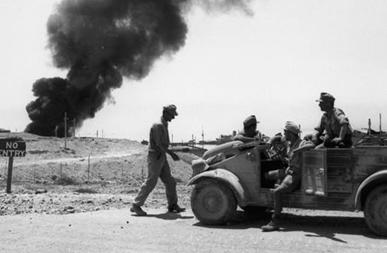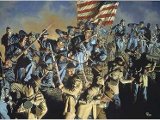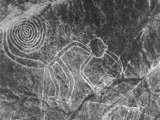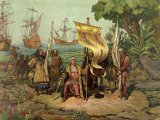The Battle of Gazala

War in the North African theater was fought from mid-1940 with neither of both sides being able to achieve a decisive victory. The newly created Afrika Korps commanded by Erwin Rommel had serious problems with the lack of fuel as well as modern equipment as its equipment was inferior to that of the German troops in Europe. The Allies, on the other hand, did not have difficulties with fuel supply but there was a great tension between the Commander-in-Chief of the Middle East and the British Prime Minister Winston Churchill. While Churchill pressed for more aggressive approach, Auchinleck disagreed and delayed offensive against Rommel.
By mid-1942, the Germans and their allies controlled most of Europe and prepared to attack Stalingrad, while the Japanese were winning in the Far East. Churchill desperately needed victory to increase the Allied morale but he also needed to recapture Cyrenaica (today's eastern region of Libya) from Rommel (he captured the region in early 1942). The British Prime Minister feared that the Germans might invade Malta and if the island would fall, the RAF would remain without its bases. But if the Allies would held Cyrenaica, an eventual loss of Malta would be less "painful". Auchinleck, however, argued that he needs time to prepare for an attack against Rommel and most of his military staff agreed. The disagreement between Churchill and Auchinleck came to the point that the Prime Minister gave the Commander-in-Chief of the Middle East an ultimatum – launch an offensive or resign. By mid-May, Auchinleck finally agreed to take more aggressive position in the North African Campaign.
At the same time when the Allies started to prepare for an offensive against Rommel, the latter prepared for a campaign against the Allies himself. The "Desert Fox", however, faced completely different problems than his adversary. Unlike Auchinleck who was under severe pressure to take action, Rommel was urged to take more careful position. He was given the green light for an offensive only when Auchinleck received an ultimatum from Churchill. The British Prime minister was right about the German plan to invade Malta and if Rommel would capture Tobruk, it would be of major significance for the planned Operation Hercules – codename for the German invasion of Malta.
Although Auchinleck agreed to take more aggressive position and launch an offensive to re-capture Cyrenaica from Rommel, the latter once against forced him into a defensive position. On May 26, 1942, the German Colonel-General launched the attack on the Gazala Line. He first sent a small unit of the Afrika Korps along the coastal route which would be the most logical place to attack. This decoy, however, was a deception. Rommel knew that the Allies would expect the assault from the coast and decided to strike with most of his forces at the southern flank of the Gazala Line and then move north to Tobruk. His strategy worked and the British forces were almost overwhelmed. Rommel, however, advanced too quickly and by May 28, he was dangerously far from his fuel supplies which prevented him from proceeding towards his goal – Tobruk. The British, on the other hand, failed to take advantage of Rommel's problem. While the commander of the 8th Army, Lieutenant-General Neil Richie was thinking about how to deal with the situation, the "Desert Fox" launched another attack and destroyed the British 150th Infantry Brigade in Sidi Muftah. Rommel's attack was very risky because he would have to retreat in case he would be defeated. He, however, succeeded and won an access to heavily needed supplies.
After destroying the British 150th Infantry Brigade on June 1, Rommel moved to Bir Hakeim but his attempt to capture the fort that was defended by the French failed. Auchinleck finally ordered Richie to launch an attack along the coastline, however, Rommel repulsed the attack and overran the Allied positions. Shortly thereafter, he renewed the attack on Bir Hakeim and on June 10, the French defenders withdrew on Richie's order. Auchinleck ordered Richie to hold the Gazala line but on June 14, he authorized withdrawal to Tobruk. The defenders, however, were not able to repulse Rommel's forces. The port fell on June 21, one day after Rommel launched the attack.
Defeat in the Battle of Gazala was a major blow to the Allied morale, while Winston Churchill described the fall of Tobruk with a "disgrace". Hitler, on the other hand, was delighted by Rommel's success who was made Field-Marshal. But despite capturing the strategically important port and gaining 2,000 tons of petroleum, Rommel was not able to take advantage of his success and strike the final blow to the Allies in the North African Campaign. In late June, he launched an offensive on the Alamein Line but he was defeated in the First Battle of El Alamein. Despite the success at El Alamein, Auchinleck was dismissed as Commander-in-Chief of the Middle East. In early August, Churchill appointed Lieutenant-General Bernard Montgomery as the commander of the 8th Army which turned out to have an enormous influence on the future course of the North African Campaign because Montgomery proved to be an equal adversary to the "Desert Fox". However, the Allies were in serious trouble after the defeat in the Battle of Gazala because they were pushed to the Alamein Line, the last stand in North Africa. If Rommel would managed to achieve another major victory, the Suez Canal could fall into the German hands and cut off the Allies from the oil supply in the Middle East.
The Germans suffered 3,360 casualties, while 50,000 Allied soldiers were killed wounded or captured in the Battle of Gazala.




